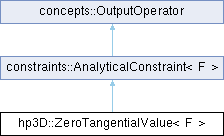Class documentation of Concepts
#include <zerotangential.hh>

Public Member Functions | |
| ZeroTangentialValue (concepts::Attribute a) | |
| ZeroTangentialValue (const ZeroTangentialValue &z) | |
| virtual void | lengthT (const concepts::Element< F > &e, uint &length) |
| virtual void | assembly (const concepts::Element< F > &e, concepts::TColumn< F > *&t, uint &n, uint &j, uint length) |
| virtual constraints::AnalyticalConstraint< F > * | clone () const |
| virtual void | localMatrix (concepts::ElementMatrix< F > &em, uint &j, const constraints::Element< F > &elm) const |
| virtual void | localVector (concepts::ElementMatrix< F > &em, uint &j, const constraints::Element< F > &elm) const |
Protected Member Functions | |
| virtual std::ostream & | info (std::ostream &os) const |
| Returns information in an output stream. | |
Detailed Description
class hp3D::ZeroTangentialValue< F >
Sets the outer product of the coefficients and the normal vector to zero in every node on an edge with chosen attribute.
- Bug:
- Does not work.
Definition at line 24 of file zerotangential.hh.
Constructor & Destructor Documentation
◆ ZeroTangentialValue() [1/2]
|
inline |
Constructor
- Parameters
-
a Attribute to identify edges
Definition at line 29 of file zerotangential.hh.
◆ ZeroTangentialValue() [2/2]
|
inline |
Definition at line 32 of file zerotangential.hh.
Member Function Documentation
◆ assembly()
|
virtual |
Returns the TColumns t for this constraint in element e. n contains the next free global index in the space of constraints.
When treating dof by dof constraints, n should be increased after the creation of the TColumn (which gets as global index the old value of n).
When treating global constraints such as a zero mean value, n should be increased only once and all local constraints have to give this index to idx in the constructor of the new TColumn.
A similar idea stands behind j: it counts the local constraints which have already been treated. It therefore has to be increased after treating a constraint. j can be taken as index for the created TColumn to fill in the correct entry.
- Parameters
-
e Element of the computational space t List of TColumns n Next free global index in the space of constraints. nis increased if a global constraint is hit for the first time.j Next free local index for the constraints in this element. jis increased accordingly when treating constraints in this element.length Length of TColumn
- See also
concepts::TColumn
Implements constraints::AnalyticalConstraint< F >.
◆ clone()
|
virtual |
Creates clone of itself and returns it. This clone function implements a virtual constructor (cf. Stroustrup p. 424).
Implements constraints::AnalyticalConstraint< F >.
◆ info()
|
protectedvirtual |
Returns information in an output stream.
Reimplemented from concepts::OutputOperator.
◆ lengthT()
|
virtual |
Computes the length of the TColumn. This method decides if this constraint is active on element e and how many local equations it generates. This is added to length.
Implements constraints::AnalyticalConstraint< F >.
◆ localMatrix()
|
virtual |
Fills the entries in the local constraints matrix em.
- Parameters
-
em Local constraints matrix. Has to be filled. The rows correspond to local dofs, the columns correspond to the equations this constraints creates in this element. j Local number of the constraints. Everytime, when a active constraint on the element is treated, jhas to be increased by the number of equations this constraint created.elm Element of the constraints space
Implements constraints::AnalyticalConstraint< F >.
◆ localVector()
|
virtual |
Fills the entries in the local constraints vector em. The parameters have the same meaning as in localMatrix.
Implements constraints::AnalyticalConstraint< F >.
The documentation for this class was generated from the following file:
- hp3D/zerotangential.hh
Generated on Wed Sep 13 2023 21:06:56 for Concepts by
